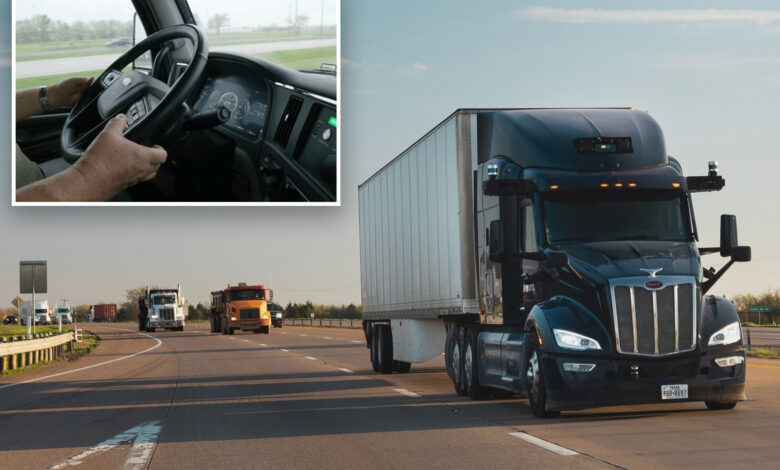Self-driving semi-trucks have already hit the road

They’re reinventing the 18-wheeler.
As if automated automobiles weren’t impressive enough, now self-driving semi trucks could potentially replace their human counterparts on US highways, thanks to the trial of fully autonomous trucks in Texas.
A new class of self-driving trucks will hit the road solo sans human chaperones as two major tech firms — Aurora Innovations and Kodiak Robotics — debut fully automated rigs in the Lone Star State, the Washington Post reported.
Founded in 2017 by former Uber execs, Google’s self-driving project and Tesla, Aurora has been training its driverless rigs in Texas since 2020.
Now the firm plans to have 20 autonomous vehicles operating a 240-mile stretch of road between Dallas and Houston, and hopes to deploy thousands of these cybernetic semis in several years.
Kodiak Robotics — the brainchild of an Uber alum and Alphabet’s Waymo — is right on its wheels: It also foresees rolling out robotic cargo carriers by the end of the year.
And a third firm, Daimler Trucks, claims they’ll have a fleet of driverless rigs plying the US highways by 2027.
These dry runs could have major implications for the future of trucking.
Autonomous trucks could potentially revolutionize the industry by reducing travel time and canceling the costs and physical limitations of human drivers — a robo-rig isn’t going to fall asleep at the wheel, for instance.
Indeed, while they may look like a typical truck on the outside — denoted only by a small rear-facing sign that says “AUTONOMOUS TEST VEHICLE” — the interiors are outfitted with advanced computers that do a variety of functions, including warning them of potential hazards with animated depictions of tire debris along the road, an SUV merging without a signal and other alerts.
Despite the automated safeguards, experts fear that driverless rigs could wreak havoc on the highway.
Last year, self-driving cars were involved in 128 crashes in California alone. The most infamous incident involved a San Francisco woman who was dragged 20 feet by a robo-taxi.
Now scale up that incident to a 35,000-pound semi.
“Even with these small vehicles, it has been a disaster,” lamented Peter Finn, a vice president of the Teamsters Local Union 856, which represents truckers “The notion that there is going to be no human being in large trucks barreling down the highways absolutely frightens me.”
Not to mention that trucks operated by all three aforementioned firms have been involved in accidents, fortunately, none of which were fatal.
There’s also the prevailing fear that autonomous trucks could render human drivers obsolete, just as automation threatens to do in every sector from manufacturing to restaurants and even law.
“It’s too new for me to trust,” Richard Gaskill, 50, who’s been a trucker in Texas since 1998, said while describing the technology. “I don’t like the idea of these being out there taking our jobs.”
Currently, a dozen states, including Texas, Florida, Arizona and Nevada, permit driverless operations while 16 have no explicit regulations against it, meaning that self-driving rigs are allowed on their roads by default.
The remaining 10 states, including New York, have restrictions on autonomous vehicles driving within their borders.
Last month, NYC Mayor Eric Adams greenlit the deployment of robo-taxis on city streets. The only caveat was that they have a human in the car in case anything goes haywire — like a driving instructor for robots.




